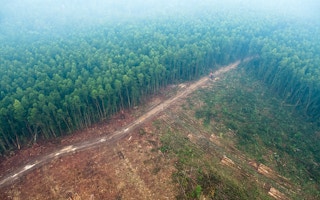Ask most people which products contribute toward the destruction of forests, and they’ll probably mention palm oil, beef, or soybeans. So news that France has adopted a National Strategy to Combat Imported Deforestation is promising, not least because it aims to end deforestation caused by importing “unsustainable forest and agricultural products” by 2030.
The European Union is a major importer of palm oil (17 per cent of global imports), soy (15 per cent), rubber (25 per cent), beef (41 per cent), maize (30 per cent), cocoa (80 per cent) and coffee (60 per cent). According to the United Nations’ Food and Agriculture Organization (FAO), almost 80 per cent of all deforestation is driven by agriculture. A study published in September similarly found the main drivers of forest loss to be permanent commodity-driven deforestation (27 per cent), forestry (26 per cent) and shifting agriculture (24 per cent).
Accused of being complicit in not only deforestation but also related human right abuses, the EU and its members are keen to reduce the impact of their commercial activities. The aim of France’s new strategy, announced in November, is stated on the French government’s official website as, “To encourage every actor (producers, businesses, investors and consumers), to change their practices in order to reduce deforestation.”
A handful of planned measures are listed, too, including 60 million euros ($69 million) per year in “development aid” to help exporting countries and regions offer more sustainable produce, tackle deforestation and implement reforestation projects.
“
A package of interventions which address the supply, demand and finance dimensions, building on and reinforcing existing EU action as well as government and private sector commitments on zero deforestation and other relevant international initiatives.
Other initiatives include creating a “zero deforestation” label for consumer products, promoting alternatives to imported vegetable proteins, and putting a cap on biofuels derived from raw materials.
France’s strategy, however, is just one piece of a much bigger puzzle that the EU is trying to put together. The picture on the front of the box shows thriving forests, rich biodiversity and a sustainable trade in timber and agricultural products. But policymakers are still struggling to see where the pieces depicting biofuel cars, a thriving meat industry, and mountains of pretty chocolate boxes fit in.
Time for action
The 2030 date is not the first target to have been set in relation to deforestation. In 2008, the EU pledged to halt global forest cover loss by 2030 at the latest and at least halve gross tropical deforestation by 2020. It is also bound to the UN’s Sustainable Development Goal of ending deforestation by 2020, and endorsed the 2014 New York Declaration on Forests, which pledges to cut natural forest loss in half by 2020 and strive to end it by 2030.
With these deadlines fast approaching, the EU is under increasing pressure from various quarters, including its own member states. The Amsterdam Declaration group, whose members include France, the United Kingdom, Germany, Italy, the Netherlands and Norway, signed an open letter calling for action. Many environmental groups and analyst—such as European forestry NGO Fern, watchdog group Environmental Investigation Agency, and Greenpeace—say what is needed is legislative force and enforced regulations.
A comprehensive feasibility study for the European Commission on options to step up EU action against deforestation does outline new legislative action as the option that “should have the greatest impact on the objective” — but it also notes that it will require the most effort and time on the part of the EU.
The EU’s ”Deforestation and forest degradation—stepping up EU action” initiative, for which public consultations are currently being held, perhaps gives an indication of where things are headed: this is, the notes point out, a “non-legislative initiative.” But not everyone is willing to wait to see if that method works. In December, for example, the French National Assembly broke with the government to pass a bill declaring that palm oil is no longer a biofuel.
Yet while EU countries rush to distance themselves from commodities associated with deforestation, in the wake of increasing public awareness, producing countries are trying hard to keep their exports flowing. For some, that means signing up to the conservation and sustainability standards increasingly demanded by EU importers; for others, it’s about seeking clients who are less concerned about the impact of deforestation. Some manage to do both.
In every producing country the picture is different. In Guyana, forest operators are working toward certification under the EU’s Forest Law Enforcement, Governance and Trade (EU FLEGT) initiative in a bid to boost its timber trade.
In Liberia, a system of community forestry management agreements was implemented—only to be “hijacked” by logging companies. In the face of low palm oil prices, Indonesia, the world’s biggest producer of the commodity, recently made it mandatory for diesel sold domestically to include 20 per cent locally produced biofuel.
Given the complexity of the global picture, and the many drivers of deforestation, the EC-commissioned feasibility study highlights the need for a comprehensive and coherent approach: “A package of interventions which address the supply, demand and finance dimensions, building on and reinforcing existing EU action as well as government and private sector commitments on zero deforestation and other relevant international initiatives.”
This story was published with permission from Mongabay.com








